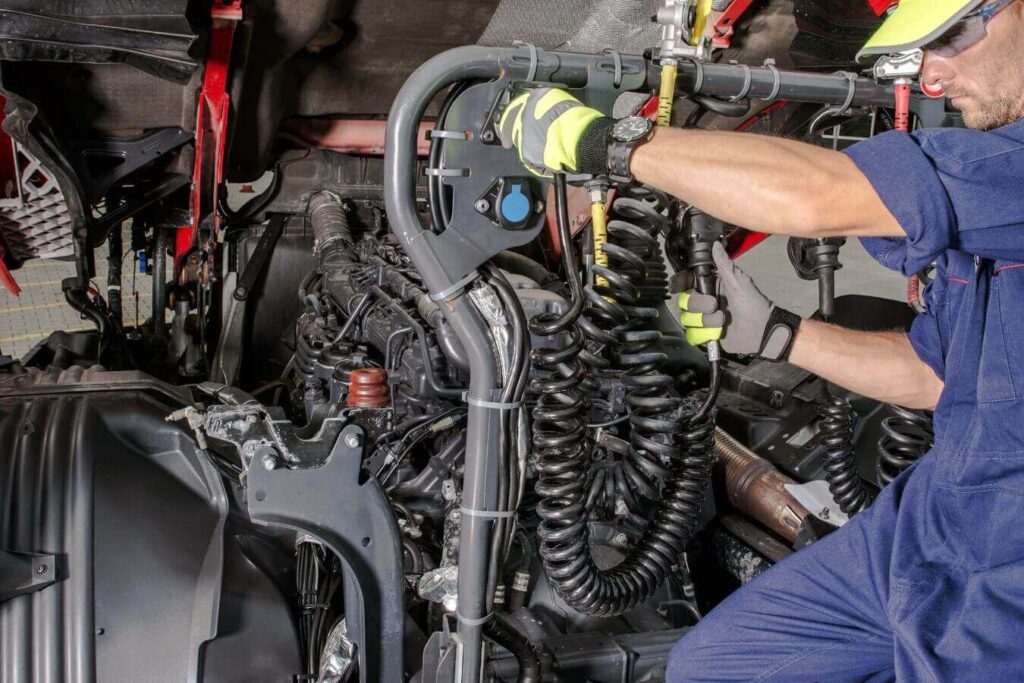Diesel trucks are essential for the transportation industry, valued for their durability, fuel efficiency, and ability to carry heavy loads. Maintaining these vehicles involves unique challenges that require expertise, careful attention, and smart planning.
In this detailed guide, we’ll explore the various challenges of diesel truck maintenance and offer practical strategies to help you handle them effectively.
1. Complexity of Diesel Engines
At the heart of your diesel truck is a complex engine designed to withstand high pressure and temperatures. Unlike gasoline engines, diesel engines use compression to ignite fuel, relying on precisely engineered parts and regular maintenance. Simple tasks like changing the oil, replacing fuel filters, and checking the cooling system are essential to prevent early wear and ensure optimal performance. Maintaining diesel engines requires skilled technicians equipped with specialized tools and diagnostic equipment to handle repairs and upkeep efficiently.
2. Emission Control Systems
Modern diesel trucks come with complex emission control systems due to strict environmental regulations. Components like diesel particulate filters (DPF), selective catalytic reduction (SCR), and exhaust gas recirculation (EGR) are crucial for reducing harmful emissions. However, these systems also introduce new maintenance challenges. Problems such as DPF regeneration failures, SCR system glitches, and EGR valve blockages can impact engine performance, fuel efficiency, and compliance with emission standards. Regularly inspecting, cleaning, and calibrating these components is essential to ensure they work properly without compromising your vehicle’s performance.
3. Fuel Quality and Contamination
The quality of diesel fuel can vary widely based on location and supplier handling. Contaminants like water, dirt, and microbial growth can enter your fuel tanks, damaging your engine’s performance. Low-quality fuel can cause clogged injectors, corrosion in the fuel system, and reduced engine efficiency. To keep your engine running smoothly, it’s essential to adopt strict fuel management practices. Regularly test your fuel, use filtration systems, and consider adding fuel additives to improve lubrication and prevent corrosion. These steps will help keep your diesel truck’s engine healthy and performing at its best.
4. Heavy Wear and Tear
Your diesel truck operates under tough conditions, from long-distance hauling to off-road driving and frequent stop-and-go cycles. These challenging environments speed up wear and tear on essential parts like brakes, tires, suspension systems, and drivetrain components. Regular inspections and preventive maintenance are essential to keep your truck running smoothly and by staying proactive, you can identify potential issues early, preventing costly breakdowns. This approach not only extends the life of your truck’s components but also enhances its reliability and safety on the road.
5. Diagnostic Challenges
Diagnosing issues in your diesel engine requires advanced tools and expertise due to its complex electronic control systems. Problems like engine misfires, sensor issues, or fuel system anomalies an be difficult to identify without the right diagnostic equipment and specialized knowledge. Skilled technicians who understand diesel engine diagnostics are essential as they can quickly and accurately pinpoint the root causes of problem,s helping your minimize downtime and control repair costs.
6. Regulatory Compliance
Complying with emissions regulations, vehicle inspections, and maintenance protocols is crucial for fleet operators. Non-compliance can result in significant fines, penalties, and operational disruptions. Staying updated on the latest regulatory requirements and following manufacturer recommendations for maintenance and emissions control is essential. Also, implementing strong record-keeping practices and conducting regular audits can help reduce compliance risks and ensure smooth operations for your fleet.
7. Skill Shortages and Training needs
Maintaining diesel trucks requires skilled technicians knowledgeable in diesel engine technology, emission control systems, and advanced diagnostics. However, there is a continuous shortage of qualified diesel mechanics, made worse by rapid technological advancements and an aging workforce. Investing in ongoing training programs, certifications, and apprenticeships is essential to develop a competent workforce capable of meeting the challenges of diesel truck maintenance. This ensures you have the expertise needed to keep your trucks running smoothly and reliably.
8. Cost Management
Effectively managing maintenance costs for your diesel trucks involves balancing operational efficiency and budget constraints. Setting up a proactive maintenance schedule based on manufacturer guidelines, performance data, and predictive analytics is key. This approach helps your business anticipate maintenance needs and prevent unexpected breakdowns. You should prioritize preventive maintenance tasks, monitor key performance indicators (KPIs), and use technology for fleet management and diagnostics. These strategies will help minimize downtime, reduce repair expenses, and improve the overall efficiency of your fleet.
Conclusion
In conclusion, diesel trucks offer unmatched reliability and efficiency for transportation and logistics. However, maintaining these vehicles requires proactive management and careful planning. By diligently addressing engine complexities, emission control systems, fuel quality management, and regulatory compliance, you can ensure your diesel truck fleet operates reliably, efficiently, and meets environmental standards.











